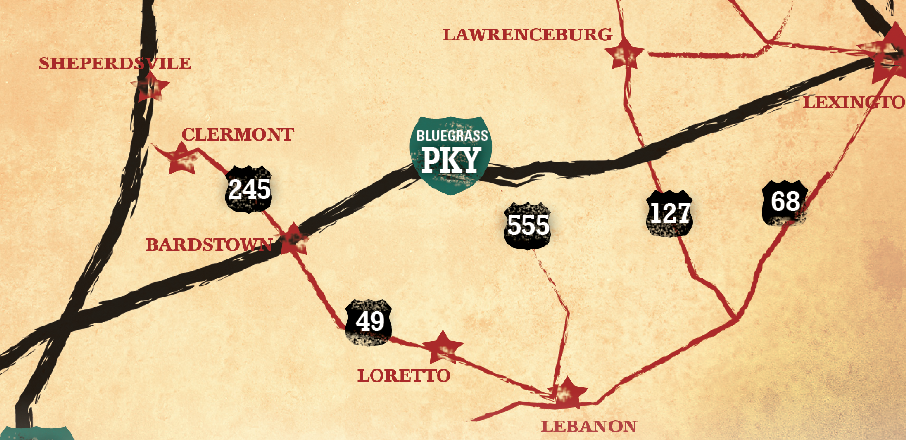Springtime in Kentucky is known for thoroughbred horse racing, but the Bluegrass State has much more to offer
By Michael C. Butz & Jon Larson
Photos / kentuckytourism.com
Visitors looking for blue grass in Kentucky, in a literal sense, will be disappointed to find none, but those looking to spend a weekend where the grass is greener, so to speak, will almost certainly be rewarded by a trip to the Bluegrass State.
“It’s such a different scenery,” says Kentucky Department of Travel Commissioner Mike Mangeot. “In some of our research, we talk to folks up north, and they say that when they cross the Ohio River into Kentucky, everything is green.”
Travel department media coordinator Marge Bateman – who lived in Cleveland’s West Park neighborhood until she and her husband moved to Kentucky in 1995 – called her new home state “beautiful.”
“Once you cross the Ohio River, the land just starts to roll,” she says. “Especially since you’re probably coming down (Interstate) 71 from Columbus, where you have that flat land. It’s like magic.
“Spring comes so much earlier here,” says Bateman, comparing Kentucky to Northeast Ohio. “We mow the lawns in April. The daffodils are already blooming (in early March). By late March, all the daffodils are up, and by April, the redbud trees are blooming.”
Scenery aside, Kentucky has much to offer out-of-towners, says Mangeot, adding that making the less-than-six-hour drive south is “really what you want it to be.”
“If you want to relax and reconnect by unplugging, we have very nice bed and breakfasts and 17 state resort parks around Kentucky, where you can hike, bike and ride horses,” he says. “If you want that urban night life, you have the Louisville-Lexington-Covington triangle.”
Here’s a small taste of the Southern hospitality that spending a weekend – or longer – in Kentucky can offer.
Equestrian attractions
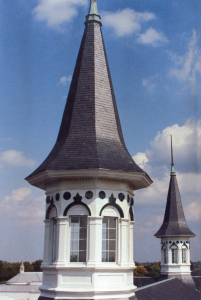 While Louisville receives worldwide attention for the Kentucky Derby, held annually the first Saturday in May at Churchill Downs, the state’s northern region offers much more.
While Louisville receives worldwide attention for the Kentucky Derby, held annually the first Saturday in May at Churchill Downs, the state’s northern region offers much more.
“There aren’t too many places crazier for horses than Kentucky,” Mangeot says.
Churchill Downs is also home to the Kentucky Derby Museum, which is open year-round and offers walking tours of the storied racetrack.
Lexington is home to the Kentucky Horse Park, a working horse farm and “educational theme park” where more than 1,000 acres are devoted to equestrian activities and events.
“While you’re there, you can book a tour of the horse farms,” Bateman says.
Also in Lexington is Keeneland, another top-of-the-line racetrack.
“It’s a historic track and it’s a great place to watch thoroughbreds run,” Bateman says.
In Georgetown, 16 miles north of Lexington, is Old Friends Equine, a retirement home and rescue facility for thoroughbreds whose racing and breeding days are behind them.
Thirty-three miles east of Louisville is Shelbyville, which Mangeot called the “Saddlebred Capital of the World.”
Kentucky Bourbon Trail
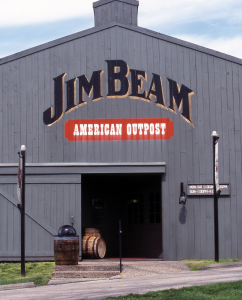 The increasingly popular trail – Mangeot called it the “most visited” attraction in the state lately – features seven distilleries peppered along the scenic Kentucky Bluegrass Highway: Four Roses, in Lawrenceburg; Heaven Hill, in Bardstown; Jim Beam, in Clermont; Maker’s Mark, in Loretto; Wild Turkey, in Lawrenceburg; and Woodford Reserve, in Versailles.
The increasingly popular trail – Mangeot called it the “most visited” attraction in the state lately – features seven distilleries peppered along the scenic Kentucky Bluegrass Highway: Four Roses, in Lawrenceburg; Heaven Hill, in Bardstown; Jim Beam, in Clermont; Maker’s Mark, in Loretto; Wild Turkey, in Lawrenceburg; and Woodford Reserve, in Versailles.
“Jim Beam American Stillhouse just opened a brand new visitors center, and Four Roses has a beautiful Spanish Mission-style visitors center,” Mangeot says.
Each distillery is situated in a small town built around it, and each offers tours at no or minimal cost. Additional local distilleries are also common, with local bourbons available nowhere else in the world.
Kentucky Wine Trail
For those whose taste goes beyond bourbon, Kentucky is home to about 85 wineries, Mangeot says.
Among them are Elk Creek Vineyards in Owenton, the state’s largest winery, which includes an outdoor stage for summer concerts; Equus Run Vineyards in the rolling hills of Midway, which offers guided tours; and Jean Farris Winery & Bistro in Lexington, which won a double gold medal for its 2007 Cabernet Sauvignon at the 2012 San Francisco Chronicle Wine Competition.
“What a lot of people don’t realize is that the first commercial vineyard in the country was in Kentucky,” Mangeot says. “Our wine trail is extensive throughout the state. It’s not as popular as the bourbon trail, but it’s growing.”
Food and music
Similar to how Cleveland’s reputation for top-notch restaurants has grown, Mangeot said Louisville’s food scene has garnered national attention. To his point, Zagat named Louisville one of its “Eight Awesome Foodie Getaways Around the World” in 2012.
Mangeot noted 21c Museum Hotel, a boutique hotel with 90 rooms that’s home to a contemporary art museum and eatery Proof On Main. The acclaimed restaurant received a top “Dishes We Love In 2012” award from the Beard Foundation for its charred octopus with bagna cauda (dipping sauce), lime and toast.
“They take it seriously; it’s not just a couple of pieces of art, and there’s a fantastic restaurant attached to it,” he says. “It’s a cool place to stay.”
There’s also Fourth Street Live!, an entertainment district that’s home to Louisville’s “wonderful” restaurants and live music, Bateman says.
Music lovers can plan a summer trip to Forecastle, an outdoor art and music festival first held in 2002.
Akron natives The Black Keys are headlining this year’s festival, which will be held July 12-14 at Louisville’s 85-acre Waterfront Park. Other acts scheduled to perform include The Avett Brothers, The Flaming Lips, Alabama Shakes, Grace Potter & The Nocturnals, and Big Boi.
“There’s a little bit of everything for everybody,” Mangeot says. “I don’t know if people think of Kentucky as they do Nashville as a place for music, but bluegrass was born in Kentucky. … Both Louisville and Lexington have very vibrant music scenes.”
Bed and breakfasts
The state offers a number of picturesque places to stay, including 19 in the “Derby Region” surrounding Louisville and 24 in the “Bluegrass Region” surrounding Lexington, according to the Bed & Breakfast Association of Kentucky.
Noteworthy options include the 1851 Historic Maple Hill Manor B&B in Springfield, which is set in a renovated country estate home and is found on a working alpaca and llama farm; The Hill House Bed & Breakfast in Loretto, which is minutes from the Maker’s Mark distillery; and Pillow & Paddock Bed and Breakfast in La Grange, which offers a bed-and-breakfast experience close to Louisville.
Historic sites and museums
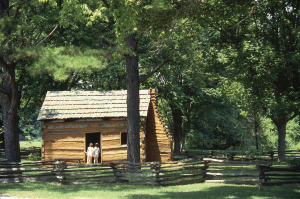 Civil War buffs have a number of options, including the birthplace of former U.S. President Abraham Lincoln in Hodgenville – which serves as the starting site for Kentucky’s Lincoln Heritage Trail – and the birthplace of Jefferson Davis, president of the Confederate States, in Fairview.
Civil War buffs have a number of options, including the birthplace of former U.S. President Abraham Lincoln in Hodgenville – which serves as the starting site for Kentucky’s Lincoln Heritage Trail – and the birthplace of Jefferson Davis, president of the Confederate States, in Fairview.
Civil War re-enactments are popular and offered at small towns throughout the region on actual battlefields. Shaker Village, the largest restored Shaker community, and Harrodsburg, the oldest English settlement west of the Alleghenies, round out the experience. Antique shops and small museums are scattered throughout.
For a more urban experience, Louisville is home to Museum Row on Main, which includes Frazier History Museum, Glassworks, Louisville Slugger Museum & Factory, the Kentucky Science Center, the Kentucky Museum of Art and Craft, The Muhammad Ali Center and The Kentucky Center for the Performing Arts.
For nature enthusiasts
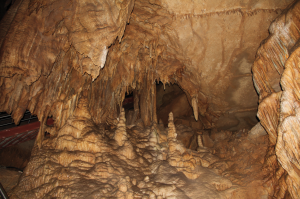 Those looking to experience the great outdoors have several options.
Those looking to experience the great outdoors have several options.
“Kentucky has more moving water than any state other than Alaska,” says Mangeot, explaining that includes “navigable water” such as rivers, streams and lakes.
Daniel Boone National Forest, southeast of Lexington, is home to Red River Gorge, Cumberland Gap and Cumberland Falls, which are known as the “Niagara of the South.”
Mammoth Cave National Park, south of Louisville, is home to the world’s longest known cave system. Tours of the cave range from 30-minute trails to full-day excursions, offering something for everyone. js

